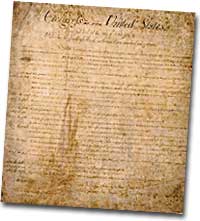18a. The Bill of Rights

Although James Madison was the youngest member of the Continental Congress, his leadership was a critical factor in the development of American government. Madison proposed the Virginia Plan, he authored some of the Federalist Papers, and he wrote the Bill of Rights.
The first national election occurred in 1789. Along with President Washington, voters elected a large number of supporters of the Constitution. In fact, almost half of the ninety-one members of the first Congress had helped to write or ratify the Constitution.
Not surprisingly, given Anti-Federalists' opposition to the strong new central government, only eight opponents of the Constitution were sent to the House of Representatives. Most Anti-Federalists concentrated their efforts in state politics.
Protection of Individual Rights
An immediate issue that the new Congress took up was how to modify the Constitution. Representatives were responding to calls for amendments that had emerged as a chief issue during the ratification process. Crucial states of Massachusetts, Virginia, and New York (among others) had all ultimately supported the Constitution — but only with the expectation that explicit protections for individual rights would be added to the highest law of the land. Now that supporters of the Constitution controlled the federal government, what would they do?
The legal tradition of having a precise statement of individual rights had deep roots in Anglo-American custom. So it's not surprising that the first Congress amended the Constitution by adding what became known as the Bill of Rights.

Amendment 10: "The powers not delegated to the United States by the Constitution, nor prohibited by it to the States, are reserved to the States respectively, or to the people."
James Madison, now a member of Congress from Virginia, once again took the leading role crafting proposed amendments that would be sent to the states for approval. Madison skillfully reviewed numerous proposals and examples from state constitutions and ultimately selected nineteen potential amendments to the Constitution.
As one might expect, the nationalist Madison took care to make sure that none of the proposed amendments would fundamentally weaken the new central government. In the end, ten amendments were ratified in 1791.
Ten Amendments
These first ten amendments to the Constitution became known as the Bill of Rights and still stand as both the symbol and foundation of American ideals of individual liberty, limited government, and the rule of law. Most of the Bill of Rights concerns legal protections for those accused of crimes.
Rights and Protections Guaranteed in the Bill of Rights
| Amendment | Rights and Protections |
|---|---|
| First |
|
| Second |
|
| Third |
|
| Fourth |
|
| Fifth |
|
| Sixth |
|
| Seventh |
|
| Eighth |
|
| Ninth |
|
| Tenth |
|
For instance, the fourth through eighth amendments provide protection from unreasonable search and seizure, the privilege against self-incrimination, and the right to a fair and speedy jury trial that will be free from unusual punishments.
The First Amendment, perhaps the broadest and most famous of the Bill of Rights, establishes a range of political and civil rights including those of free speech, assembly, press, and religion.
The last two amendments, respectively, spell out that this list of individual protections is not meant to exclude other ones, and, by contrast, set forth that all powers claimed by the federal government had to be expressly stated in the Constitution.
The Full Text of the Bill of Rights
Amendment I Congress shall make no law respecting an establishment of religion, or prohibiting the free exercise thereof; or abridging the freedom of speech, or of the press; or the right of the people peaceably to assemble, and to petition the Government for a redress of grievances.
Amendment II A well regulated Militia, being necessary to the security of a free State, the right of the people to keep and bear Arms, shall not be infringed.
Amendment III No Soldier shall, in time of peace be quartered in any house, without the consent of the Owner, nor in time of war, but in a manner to be prescribed by law.
Amendment IV The right of the people to be secure in their persons, houses, papers, and effects, against unreasonable searches and seizures, shall not be violated, and no Warrants shall issue, but upon probable cause, supported by Oath or affirmation, and particularly describing the place to be searched, and the persons or things to be seized.
Amendment V No person shall be held to answer for a capital, or otherwise infamous crime, unless on a presentment or indictment of a Grand Jury, except in cases arising in the land or naval forces, or in the Militia, when in actual service in time of War or public danger; nor shall any person be subject for the same offence to be twice put in jeopardy of life or limb; nor shall be compelled in any criminal case to be a witness against himself, nor be deprived of life, liberty, or property, without due process of law; nor shall private property be taken for public use, without just compensation.
Amendment VI In all criminal prosecutions, the accused shall enjoy the right to a speedy and public trial, by an impartial jury of the State and district wherein the crime shall have been committed, which district shall have been previously ascertained by law, and to be informed of the nature and cause of the accusation; to be confronted with the witnesses against him; to have compulsory process for obtaining witnesses in his favor, and to have the Assistance of Counsel for his defense.
Amendment VII In suits at common law, where the value in controversy shall exceed twenty dollars, the right of trial by jury shall be preserved, and no fact tried by a jury, shall be otherwise reexamined in any Court of the United States, than according to the rules of the common law.
Amendment VIII Excessive bail shall not be required, nor excessive fines imposed, nor cruel and unusual punishments inflicted.
Amendment IX The enumeration in the Constitution, of certain rights, shall not be construed to deny or disparage others retained by the people.
Amendment X The powers not delegated to the United States by the Constitution, nor prohibited by it to the States, are reserved to the States respectively, or to the people.
While the Bill of Rights created no deep challenge to federal authority, it did respond to the central Anti-Federalist fear that the Constitution would unleash an oppressive central government too distant from the people to be controlled.
By responding to this opposition and following through on the broadly expressed desire for amendments that emerged during the ratification process, the Bill of Rights helped to secure broad political support for the new national government. A first major domestic issue had been successfully resolved.
Understanding the Bill of Rights
The Bill of Rights remains an active force in contemporary American life as a major element of Constitutional law. The meaning of its protections remains hotly debated. For example, the privilege to bear arms to support a militia, which appears in the second amendment, produces significant political controversy today.
More sweepingly, the extension of the Bill of Rights to protect individuals from abuse not only by the federal government, but also from state and local governments remains an unsettled aspect of Constitutional interpretation.
Originally, the protections were solely meant to limit the federal government, but with the fourteenth amendment's guarantee in 1868 that no state could deprive its citizens of the protections in the Bill of Rights this original view began to be expanded. To this day the Supreme Court has not definitively decided if the entire Bill of Rights should always be applied to all levels of government.






